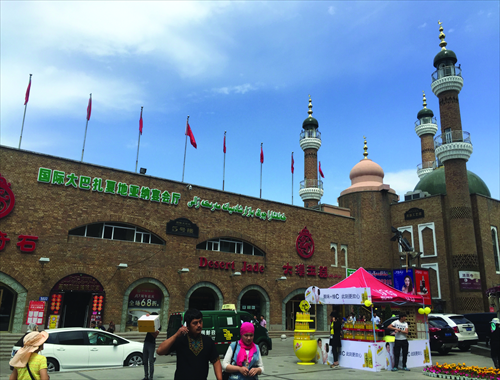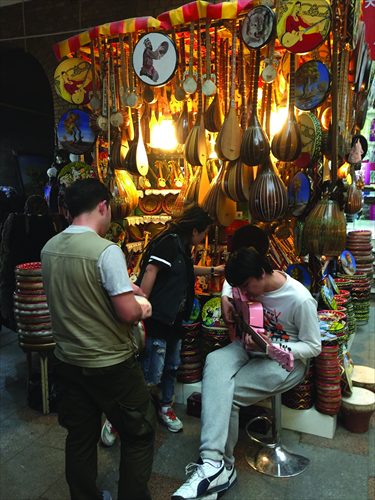Bazaars go virtual as online wave heats in Xinjiang
Traditional vendors strive to catch up with e-commerce trend

Urumqi International Grand Bazaar

A Uyghur man plays the guitar as visitors check out traditional instruments at his stall in the Grand Bazaar. Photo: Wang Cong/GT
It was a sunny and hot Friday afternoon in Urumqi, capital of far Northwestern China's Xinjiang Uyghur Autonomous Region. But not far from the city center, the Urumqi International Grand Bazaar was busy and bustling.
Outside the Islamic-styled architecture, street vendors were hailing consumers in both Uyghur and Putonghua; ethnic music was blaring from speakers on the sidewalks, as visitors in both Uyghur dress and more conventional clothes walked by.
Inside, it was a sea of colorful ethnic goods from scarves and clothes to snacks and musical instruments.
On the second floor, Abdu was playing a traditional Uyghur drum in front of his small vendor, drawing smiles and applause from a few ethnic Han visitors from the inland.
At the vendor, a few special-looking drums hanging over a counter filled with souvenir knives in all different kinds of shapes.
After the drum solo, Abdu, a Uyghur, asked in heavily accented Putonghua "Do you want to see the best thing?"
He opened a cabin underneath the counter and pulled out a few knives with Uyghur art carved on them.
"Take a look," Abdu said, as he picked up one of them and started to shave his leg, which drew another round of laughter and applause.
But nowadays, this visually and aurally rewarding scene is rare even in Xinjiang, which has diverse cultures and is home to much of China's Muslim population, mostly Uyghur and Hui.
The centuries-long tradition of the bazaar is going through a period of transformation, which can be seen at the Urumqi grand bazaar, said to be the largest in the world.
Some of these transformations have been witnessed first-hand by Abdu, who moved to Urumqi to start the business in 2003 at the opening of grand bazaar from the Kashgar area in southern Xinjiang, where bazaars are still more traditional than the one in Urumqi.
"Of course, these are not the same bazaars I see in my hometown; there were no elevators, no air conditioning in the old bazaars, there is no building; it's on the street," Abdu said.
New platform
The transformation process is still ongoing today. This time, more than just changes in architectural features, the bazaar is faced with a new transition from being a physical marketplace to a whole new platform online, a trend propelled by the thriving e-commerce sector in the country.
From the vendors' perspective, they have to follow the consumers, and that means they have to embrace the trend and open online stores, because business at the physical stores is declining.
"As you can see, business is not so good," Abdu said after the visitors left without buying anything.
That feeling is shared by many vendors at the grand bazaar. They said the number of visitors declined sharply, due to security concerns.
On top of that, more and more people are turning to the Internet to buy Xinjiang products, a trend supported by the country's thriving e-commerce sector.
But Abdu said the security situation is much improved, with a heavy police presence in the area, and things have started to pick up recently, as more visitors are coming in the last two years, especially during the July-September peak season.
New challenge
Today the major factor driving business down is e-commerce, as visitors are more inclined to buy things on popular online shopping platforms such as Taobao and JD.com, even though they like to come to the store to check out the actual products, a few vendor owners said.
"It's definitely a trend that we are facing, not just here at the Grand Bazaar, but for all the physical stores nationwide," said Su Chunlin, the owner of a store right across from Abdu's.
Su, who moved to Xinjiang from South China's Guangdong Province more than a decade ago to start a business, said he has seen many people come to his store to look at products such as jade products and traditional Uyghur medicine but then went online to buy them.
Faced with the trend, many vendors also turned to online platforms to sell their products, but things didn't turn out to be the way they had quite hoped.
"It's impossible to compete with these online stores because they offer much cheaper prices and convenient shipping arrangements," said Su.
He said the logistics system in Xinjiang is not as developed as other parts of the country, which slows the shipping time. And some of the online stores specializing in Xinjiang products are large-scale wholesalers with better operation systems.
And for Uyghur vendor owners like Abdu, the difficulty is not just the competition. Language can be an issue as well.
When asked if he has opened an online store, Abdu said he doesn't know how. "I can't read Chinese very well so I don't know how it works," he said.
A few other Uyghur vendors also said they had difficulties navigating through the process of opening an online store and didn't even try to bother.
In interviews with five Uyghur business owners, only one said his family had opened a store online.
"Yes, you can buy our products online," said a boy who was helping his parents selling Uyghur music instruments like drums and guitars while doing his homework.
"My sister is doing that. She speaks Putonghua well and knows how it works," he said.